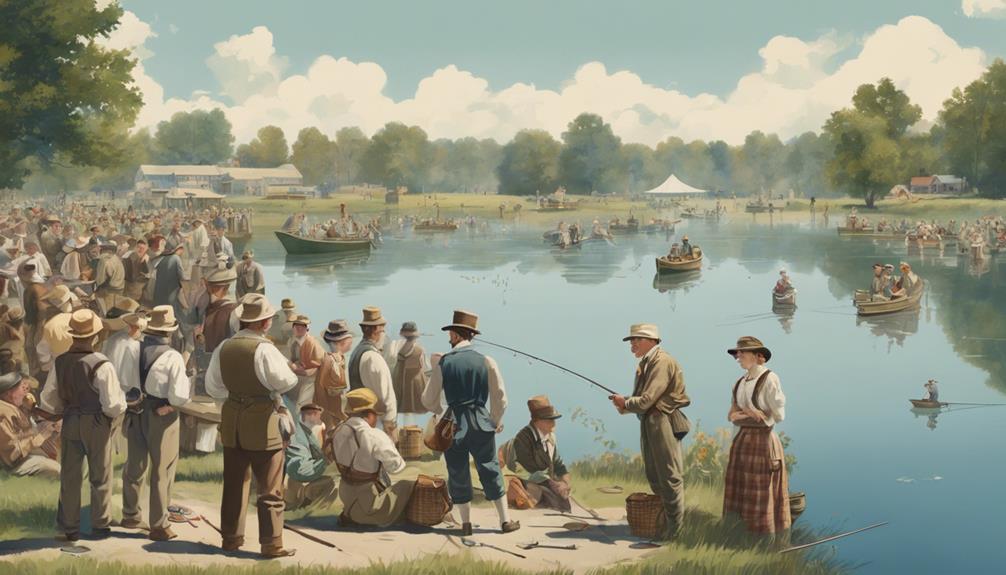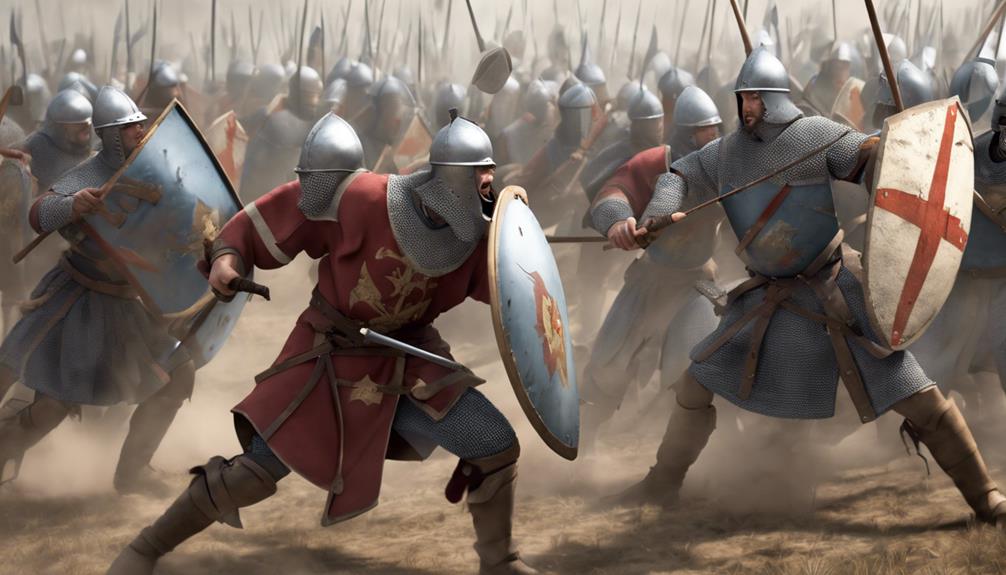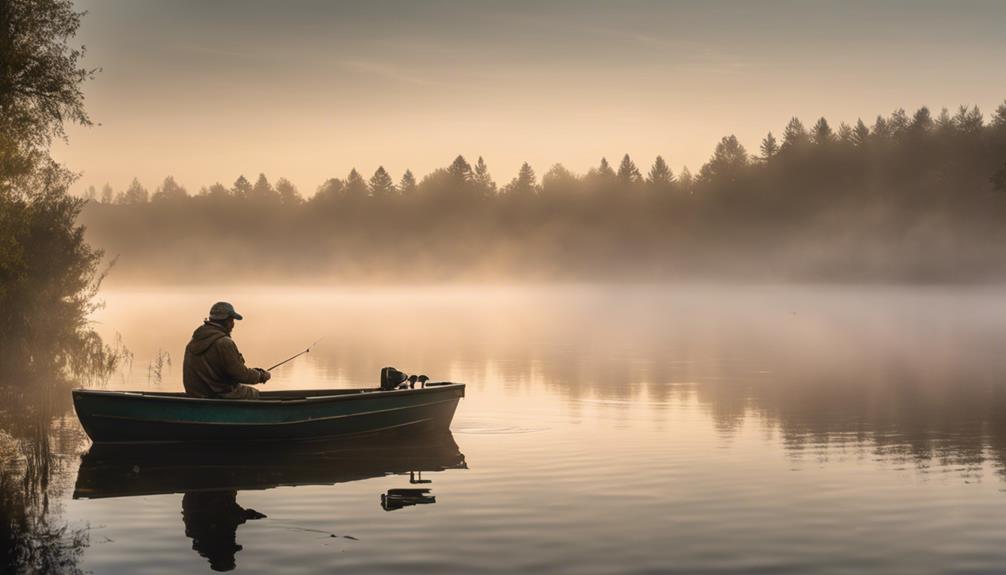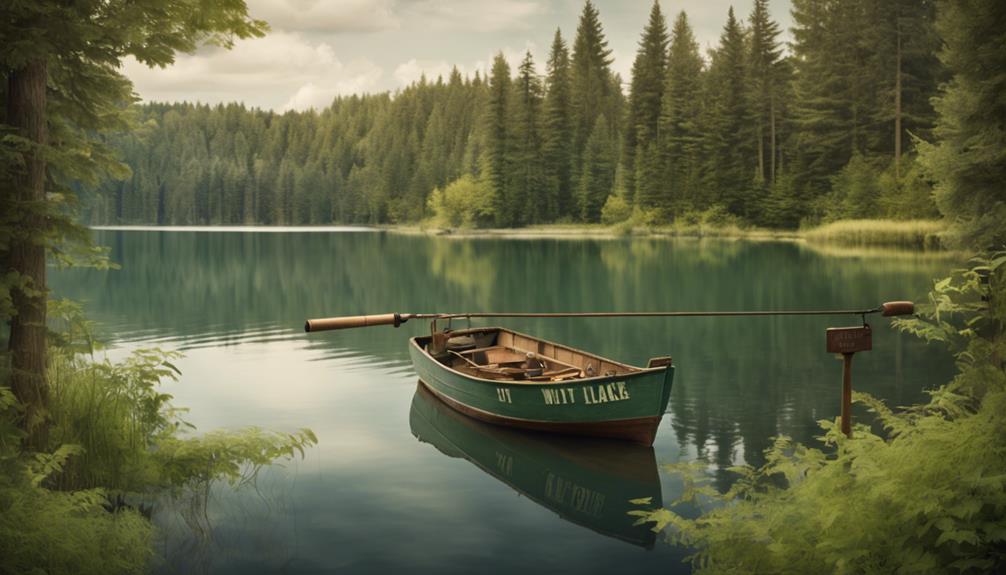Historical fishing and angling tournaments began to highlight fishermen's skills, infuse competition into the fishing tradition, and set the stage for organized contests in fishing communities. Rooted in showcasing prowess and catch size, these early tournaments birthed structured competitions that evolved over time. By establishing rules, ensuring fairness, and fostering camaraderie, angling clubs played a pivotal role in shaping the competitive fishing landscape. With advancements in technology enhancing gear and coordination, tournaments became more efficient and engaging. The evolution of angling tournaments continues to elevate competitiveness, promote sportsmanship, and refine fishing techniques.
Early Origins of Angling Competitions
During the medieval period, the earliest known angling competitions emerged as a way to showcase fishermen's skills and catch. These competitions had their origins deeply rooted in the traditions of communities where fishing wasn't only a means of sustenance but also a way of life. The competitive aspect added an exciting dimension to the otherwise solitary activity of fishing, bringing together individuals to test their abilities against one another.
Traditions surrounding fishing tournaments varied from region to region, reflecting the cultural diversity of the medieval world. In some areas, these competitions were organized as part of seasonal festivals, celebrating the bounty of the waters and the camaraderie among fishermen. Participants would gather at designated fishing spots, armed with their rudimentary fishing gear and a spirit of friendly competition. The traditions of these early angling competitions laid the foundation for the structured tournaments we see today.
The origins of angling competitions can also be traced back to the desire for recognition and prestige among fishermen. As skilled anglers caught impressive hauls, their reputation grew within their communities, leading to informal challenges and eventually organized tournaments. These early competitions weren't just about the catch but also about the display of technique, patience, and expertise in the art of fishing.
Development of Formal Tournament Rules
The development of formal tournament rules in angling competitions marked a significant shift towards standardization and fairness in the competitive fishing landscape. Rule enforcement became crucial to ensure fair play and prevent any form of cheating or advantage-taking. These rules established a level playing field for all participants, enhancing the integrity of angling tournaments.
Fairness was at the core of designing these rules. They aimed to create an environment where every angler had an equal opportunity to showcase their skills and techniques. By outlining guidelines for equipment use, fishing locations, and catch evaluation, these rules promoted transparency and equality among competitors. Rule enforcement mechanisms were put in place to uphold the principles of sportsmanship and camaraderie within the angling community.
Sportsmanship played a vital role in shaping these formal tournament rules. Anglers were expected to demonstrate respect towards fellow competitors, tournament officials, and the natural environment. The rules encouraged ethical behavior, discouraging unsportsmanlike conduct and fostering a sense of mutual respect among participants. Camaraderie flourished as anglers adhered to these guidelines, creating a harmonious atmosphere where the spirit of competition was balanced with mutual appreciation for the shared passion of angling.
Influence of Angling Clubs
Angling clubs significantly shape the competitive fishing landscape by fostering community engagement and promoting skill development among members. These clubs serve as pivotal hubs where individuals with a shared passion for fishing come together to participate in tournaments, workshops, and social events. Community involvement lies at the core of angling clubs, providing members with a sense of belonging and a platform to exchange knowledge and experiences.
Membership benefits play a crucial role in attracting and retaining anglers within these clubs. By joining an angling club, individuals gain access to exclusive fishing spots, expert guidance from seasoned anglers, and opportunities to enhance their angling skills through workshops and training sessions. Additionally, being part of a club opens doors to networking opportunities, where members can forge valuable connections within the fishing community.
Angling clubs also contribute to the preservation of fishing traditions and environmental conservation efforts. Through organized clean-up drives, educational programs, and advocacy initiatives, members actively participate in safeguarding aquatic ecosystems and promoting sustainable fishing practices. By engaging in these activities, anglers not only deepen their appreciation for nature but also play a vital role in ensuring the longevity of the sport for future generations.
Impact of Technological Advancements
Technological advancements have revolutionized the landscape of competitive fishing, reshaping the way anglers approach tournaments and enhancing their overall fishing experience. Here's how these advancements have made an impact:
- Fishing Gear: Modern fishing gear has undergone significant improvements due to technological advancements. From high-performance fishing rods with advanced materials that offer increased sensitivity and strength to state-of-the-art reels with precise drag systems, anglers now have access to tools that enhance their ability to catch fish efficiently. The evolution of fishing gear hasn't only made the sport more accessible but has also elevated the level of competition in fishing tournaments.
- Electronic Devices: The integration of electronic devices has transformed the way anglers navigate waters and locate fish. GPS technology allows competitors to mark productive fishing spots accurately, while fish finders and underwater cameras provide real-time data on fish location and behavior. Anglers can now make informed decisions based on this data, increasing their chances of a successful catch during tournaments. Electronic devices have become indispensable tools for anglers looking to gain a competitive edge in fishing competitions.
- Communication Systems: Communication systems like two-way radios and wireless fish tracking devices have improved coordination among tournament participants. Anglers can now share information about successful fishing techniques, productive fishing spots, and changing weather conditions in real-time, fostering a sense of community and sportsmanship among competitors. The ability to communicate effectively during tournaments has streamlined the fishing experience and contributed to the overall success of fishing tournaments in the modern era.
Growth of Recreational Fishing Culture
With the rise in popularity of fishing as a recreational pastime, the culture surrounding recreational fishing has experienced significant growth in recent years. This growth can be attributed to various factors, such as the increasing recognition of fishing as a leisure activity that offers a peaceful escape from the hustle and bustle of daily life. Many individuals have turned to fishing as a way to unwind, relax, and connect with nature, leading to a surge in the number of people participating in this pastime.
One notable aspect of the growth of recreational fishing culture is the emphasis on social bonding. Fishing trips often provide an opportunity for friends and family members to come together, share experiences, and create lasting memories. The act of fishing itself fosters a sense of camaraderie and teamwork, as individuals collaborate to bait hooks, reel in catches, and celebrate each other's successes.
Moreover, the leisurely nature of fishing allows participants to engage in meaningful conversations, bond over shared interests, and strengthen relationships. Whether it's casting a line from the shore, embarking on a deep-sea fishing expedition, or participating in a local angling tournament, the culture of recreational fishing continues to evolve, attracting a diverse range of enthusiasts who appreciate the tranquility and camaraderie that this activity offers.
Role of Conservation Efforts
Conservation efforts play a crucial role in sustaining the delicate balance of aquatic ecosystems amidst the growing popularity of recreational fishing. Without proper management and protection, the increased pressure from fishing activities could have detrimental effects on the environment. Here are some key points highlighting the significance of conservation initiatives and environmental awareness in the realm of fishing tournaments:
- Preservation of Fish Populations: Conservation efforts focus on ensuring sustainable fishing practices to prevent overexploitation of fish stocks. By implementing regulations such as catch limits and size restrictions, these initiatives help maintain healthy fish populations for future generations.
- Habitat Protection: Environmental awareness plays a vital role in safeguarding the habitats essential for fish breeding and survival. Through initiatives like habitat restoration projects and pollution control measures, conservationists strive to create a conducive environment for aquatic species to thrive.
- Biodiversity Conservation: Conservation initiatives extend beyond individual fish species to encompass the preservation of overall biodiversity within aquatic ecosystems. By promoting responsible fishing practices and raising awareness about the interconnectedness of species, efforts are made to protect the delicate balance of marine and freshwater environments.
Economic Incentives for Tournaments
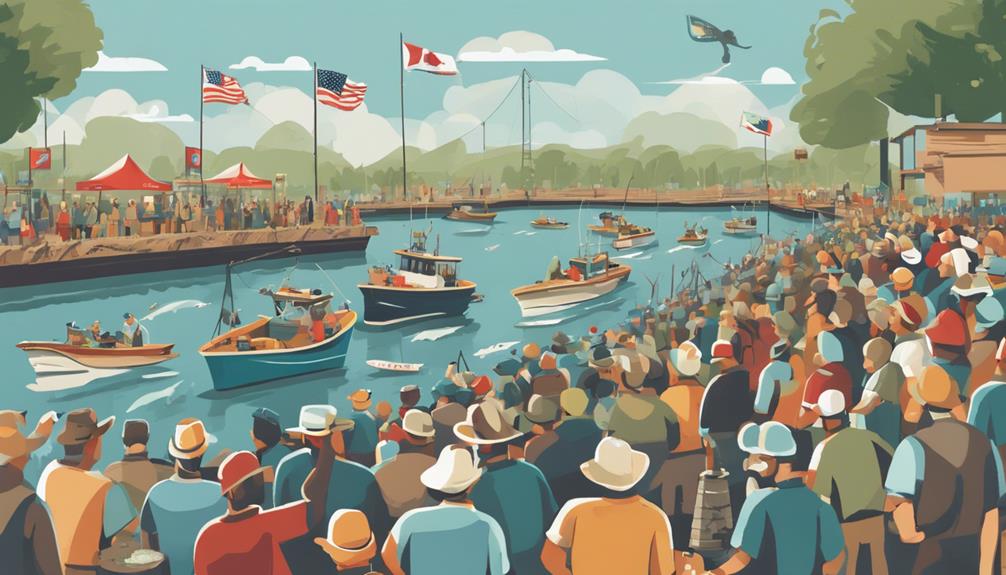
Economic incentives play a pivotal role in shaping the competitive landscape of fishing tournaments, influencing participation rates and financial gains for anglers and organizers alike. The lure of monetary rewards drives anglers to compete in tournaments, with the potential to win cash prizes, sponsorships, or other valuable gifts. These incentives not only attract skilled anglers but also encourage novice fishermen to test their abilities in a competitive setting.
Monetary rewards in fishing tournaments can vary significantly based on the event's scale and sponsors involved. Large-scale tournaments sponsored by major companies or organizations often offer substantial cash prizes, enticing professional anglers to participate. These significant rewards not only create a competitive environment but also contribute to the overall growth and popularity of angling tournaments.
Moreover, sponsorships play a crucial role in providing financial support for fishing tournaments. Companies within the fishing industry or outdoor recreation sector often sponsor events to gain exposure and promote their products. In return, sponsors may offer monetary contributions, equipment, or merchandise prizes, enhancing the overall prize pool for participants.
Evolution of Modern Angling Tournaments
The evolution of modern angling tournaments has seen a shift towards incorporating advanced technologies and data-driven strategies to enhance competition and engagement among participants.
- Enhanced Competitive Spirit:
Modern angling tournaments have heightened the competitive spirit among participants by introducing real-time scoring systems and live leaderboards. Anglers can now track their progress instantaneously, fueling their drive to outperform others and showcasing their skills.
- Emphasis on Sportsmanship:
Despite the competitive nature, modern angling tournaments also emphasize sportsmanship. Anglers are encouraged to respect both the fish they catch and their fellow competitors. This focus on ethical angling practices has become a cornerstone of contemporary tournaments, promoting a sense of camaraderie among participants.
- Advancements in Angling Techniques:
The evolution of modern angling tournaments has led to a deeper exploration of angling techniques and strategies. Anglers now have access to cutting-edge equipment, specialized baits, and expert knowledge, allowing them to refine their skills and adapt to different fishing conditions. This emphasis on technique hasn't only elevated the level of competition but also enriched the overall angling experience for participants.
Frequently Asked Questions
How Did Cultural Beliefs Influence Early Fishing Competitions?
When examining early fishing competitions, cultural beliefs played a significant role in shaping these events. Cultural traditions influenced the rules, rituals, and even the types of fish targeted in these contests.
The historical significance of these competitions goes beyond mere sport; they reflected societal values, community bonds, and sometimes even religious practices. Understanding how cultural beliefs intertwined with fishing tournaments provides insight into the diverse motivations behind these activities.
What Role Did Politics Play in Shaping Tournament Rules?
Politics played a crucial role in shaping tournament rules. Political influence often determined the regulations surrounding fishing competitions, impacting everything from equipment restrictions to catch limits.
Through political maneuvering and lobbying efforts, certain groups were able to sway rule development in their favor, creating a competitive environment that reflected the interests and agendas of those in power. The interplay between politics and rule-making continues to shape fishing tournaments to this day.
Are There Any Famous Scandals in Angling Club History?
When it comes to angling controversies and tournament scandals, the history of angling clubs isn't devoid of drama. From accusations of cheating to disputes over rule interpretations, famous scandals have rocked the angling community. These incidents have often led to heated debates, changes in regulations, and a renewed emphasis on fair play within the sport.
Despite these controversies, angling clubs continue to strive for integrity and sportsmanship in their tournaments.
How Have Climate Change and Pollution Affected Fishing Tournaments?
Climate change and pollution have had a significant impact on fishing tournaments. Environmental changes have disrupted marine ecosystems, leading to declines in fish populations and affecting the quality of fishing grounds.
In response, conservation efforts emphasize sustainable practices to protect the environment and ensure the future of angling. By promoting responsible fishing practices and raising awareness about the effects of climate change and pollution, anglers can help preserve marine ecosystems for future generations.
Do Sponsors Have a Significant Impact on Tournament Outcomes?
Sponsors play a crucial role in fishing tournaments, impacting outcomes significantly. Their influence can be seen in various aspects, from prize pools to participant engagement. Understanding sponsor dynamics is vital for achieving tournament success.
Conclusion
In conclusion, historical fishing and angling tournaments began as a way to showcase skills, promote sportsmanship, and foster camaraderie among anglers.
The development of formal rules, the influence of angling clubs, and the impact of technological advancements have all played a role in shaping the evolution of these competitions.
With a growing interest in recreational fishing and a focus on conservation efforts, modern angling tournaments continue to thrive, offering economic incentives and opportunities for anglers to test their abilities.
